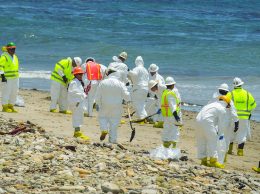Phillips 66 proposes fewer trains for rail expansion at Santa Maria refinery
Phillips 66 is now proposing to run fewer trains for its rail expansion project at its Santa Maria refinery in an attempt to allay the San Luis Obispo County Planning Commission’s environmental concerns.
For its original five weekly trains proposal, county staff noted 11 significant and unavoidable environmental impacts associated with the increased operations at the Phillips 66 Nipomo Mesa refinery at 2555 Willow Road.
Those include emissions exceeding SLO County Air Pollution Control District standards, agricultural, health and safety standards posed by potential derailments, biological resource impacts and first responders who are not equipped to deal with a derailment, among others.
The project’s benefits would not outweigh the hazards, county staff said in its recommendation to reject the proposal.
Phillips 66 contends that reducing the trains to three per week from the originally proposed five eliminates all significant environmental impacts “with respect to the onsite or non-preempted activities with the project,” said attorney Jocelyn Thompson of the law firm Alston & Bird that’s representing Phillips 66.
Since Union Pacific owns the interstate railroads that fall under the regulation of federal authorities per the Interstate Commerce Commission Termination Act of 1995, Phillips 66 argues that state and local jurisdictions do not have authority over its “mainline” track operations.
The issue is currently being deliberated at the California Supreme Court and other courts. Union Pacific has opposed local regulation that would clog its railways and delay operations, county counsel Whitney McDonald said.
“There is a limit to what the county can do here,” she said at a jam-packed Feb. 4 planning commission meeting that is expected to span multiple days. “Even though we have jurisdiction over the site and the permit for the rail spur and loading facility, if we attempt to place regulations on the rail carrier that is preempted by federal law.”
The applicants’ view of preemption goes too far, McDonald continued.
“The planning commission is at the forefront of it,” she said.
Local jurisdictions and state officials worry that federal guidelines are more lax. The Pipeline Hazardous Materials and Safety Administration is one of the federal regulators responsible for overseeing rail operations. PHMSA was also responsible for Plains All American Pipeline’s Line 901, which spilled more than 143,000 gallons of crude in May that soiled the Gaviota Coast and beyond.
Phillips 66 is pursuing the rail extension because the Plains All American Pipeline Line 901 and connecting Line 903 shutdown have limited their operations. It would allow them to source crude oil outside of California and throughout other areas of North America, the company said. Yet, the rail extension would not increase their production capacity.
Phillips 66 argues that the project would add 12 permanent jobs and a peak of 200 workers over about 10 months of construction. The company also says it would protect the current jobs of its workers at the refinery, which are threatened by the pipeline shutdowns. The company employs 130 full-time workers and 75 contractors with an annual payroll of $44 million. It generates $2.2 million in annual tax revenue for the county, the company said.
Elected officials throughout the Tri-Counties and as far as the Bay Area expressed their disapproval of the project at the meeting. Regardless of how many trains per week run, three or five, all it takes is one derailment to inextricably change a community, its residents and the environment, they said.
A unit train consists of three locomotives, two buffer cars and 80 rail cars carrying approximately 27,300 gallons of crude each, totaling about 2.19 million gallons.
Pipeline oil transportation is much safer than moving crude by road, rail or barge when measuring incidents, injuries and deaths, according to a 2013 report on the safety of intermodal transportation of oil by the Fraser Institute, a non-partisan Canadian think tank.
• Contact Alex Kacik at [email protected].











